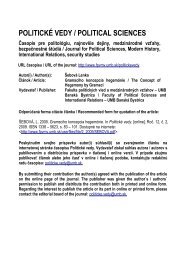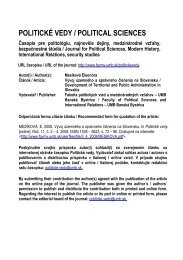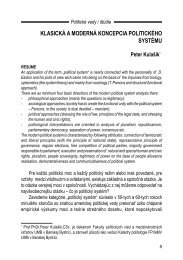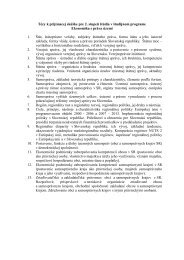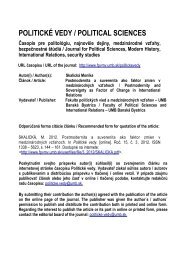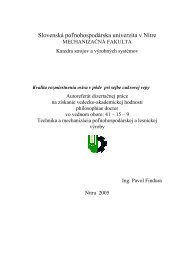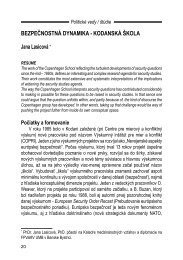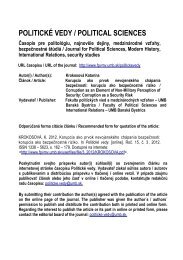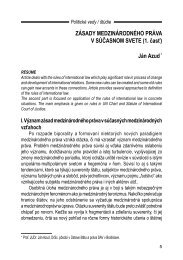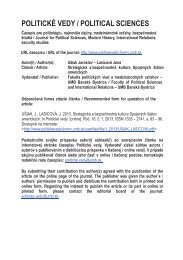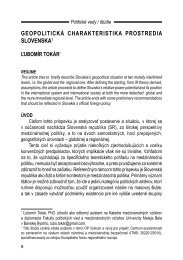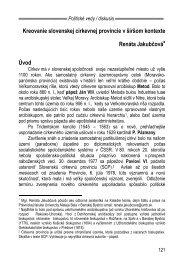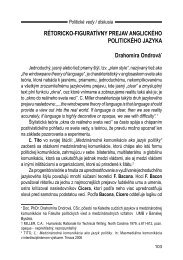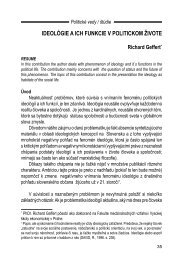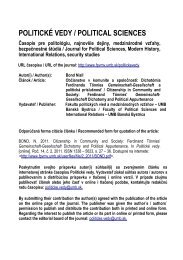MRAVNÃ VÃCHOVA V Å KOLÃCH NA SLOVENSKU A V ZAHRANI ÄÃ
MRAVNÃ VÃCHOVA V Å KOLÃCH NA SLOVENSKU A V ZAHRANI ÄÃ
MRAVNÃ VÃCHOVA V Å KOLÃCH NA SLOVENSKU A V ZAHRANI ÄÃ
You also want an ePaper? Increase the reach of your titles
YUMPU automatically turns print PDFs into web optimized ePapers that Google loves.
consequences. In special circumstances hierarchy of the values in the process of ethical or moral<br />
thinking and their performance is applied. The performance of the basic values is prior to the<br />
secondary values. In terms of basic values, performance of positive social consequences or at least<br />
reduction of negative social consequences is prior to other basic values.<br />
Jonathan Baron is of a similar opinion that in the process of moral education it is substantial to teach<br />
children to consider future consequences as well as consequences emerging from their decisions in<br />
relation to others. Older children can be taught to regard wider and further consequences. Thus the<br />
space for considering consequences and responsibility relating to, for example, society functioning,<br />
environment etc. is created. It is necessary to emphasize the fact that the majority of our decisions<br />
contains consequences to other people. It is equally important for children to learn about feelings and<br />
desires of other people, although it does not involve only moral education but also languages, history,<br />
psychology etc. Special attention should be paid to long term consequences of our decisions. Children<br />
have to be taught to perceive probable consequences as possible, as it can protect us against many<br />
potential future dangers. It is also essential to lead students to being honest in their thinking. It means<br />
not to oversee certain alternatives, evidence against their own opinions. They also have to be honest<br />
towards other opinions. According to Baron, within such moral education, consequences do not have<br />
to be perceived as the only criteria for students´ thinking. However, it is important that students in<br />
their thinking consider consequences to others, long term consequences of their decisions and<br />
consequences to strangers and unknown people. Good decision-making is really demanding and<br />
uncertain. People capable of it are able to respect opinions of others and they are more open to<br />
arguments. Entirely intuitive moral presents things simpler than they really are (Baron, 1990, s. 82-<br />
84).<br />
I am of the opinion that the ethics of social consequences offers such possibility for moral education<br />
and development of critical moral thinking: on the one hand, it emphasizes basic values accepted by<br />
the moral of the society, i.e. humanity, human dignity, moral right for life, justice, responsibility, duty<br />
and tolerance. On the other hand, in the process of moral thinking it requires to regard future or past<br />
consequences emerging from our thinking, decision-making and acting. The aim is to create a model<br />
of moral rational thinking on the basis of strictly stated criteria, which form sufficient conditions for<br />
free decision-making and acting of the moral agent, his higher responsibility, which should be<br />
determined by the effort to achieve positive social consequences emerging from our behaviour and<br />
acting or at least to achieve predominance of the positive over negative social consequences.<br />
This is only one of possible suggestions that can be discussed and assessed by experts. It is essential to<br />
make the contents of moral education object of a critical discussion that should lead to the search for<br />
an optimal model corresponding with the era of the 21 st century and its ethical and moral issues.<br />
Bibliography<br />
BARON, J., 1990. Thinking about Consequences. In: Journal of Moral Education. 1990, r. 19, č. 2, s.<br />
77-87.<br />
BEŇO, M., 2004. Nealternatívna alternatíva. In: Učiteľské noviny. 2004, r. 54, č. 32, s. 4.<br />
Bureš, R., 1992. Analytická etika – její možnosti a limity. In: Etika. 1992, r. 4, č. 2, s. 59-65.<br />
CALVERT, K., 2007. Creative Philosophizing with Children. In: Theory and Research in Education.<br />
2007, r. 5, č. 3, s. 309–328.<br />
FISHER, R., 2001. Philosophy in primary schools: fostering thinking skills and literacy. In: Reading:<br />
Literacy and Language. 2001, r. 35, č. 2, s. 67-73.<br />
GLUCHMAN, V., 1997; 2005. Človek a morálka. Brno: Doplněk, 1997 (2. vyd. Prešov: LIM, 2005).<br />
289



